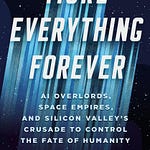When is lack of knowledge a writer’s best friend? New York Times bestselling author and Guggenheim winner Richard Panek has found that starting from a place of relative ignorance allows him to research and then write about complicated subjects in a way that allows the average reader to find their own way in. We speak with Richard on the book birthday of his newest title, Pillars of Creation: How the James Webb Space Telescope Unlocked the Secrets of the Cosmos. He discusses how he found the form for the book, his favorite punctuation and how it helps to create a more conversation tone, how blog writing informs his book writing, and trying creative things you haven’t tried before.
Richard Panek is the author of numerous books including The 4% Universe: Dark Matter, Dark Energy, and the Race to Discover the Rest of Reality, which won the American Institute of Physics communication award and was longlisted for the Royal Society Prize for Science Books. The recipient of fellowships from the John Simon Guggenheim Foundation and the New York Foundation for the Arts as well as an Antarctic Artists and Writers grant from the National Science Foundation, he is also the co-author with Temple Grandin of The Autistic Brain: Thinking Across the Spectrum, a New York Times bestseller. His own books have been translated into sixteen languages, and his writing about science and culture has appeared in publications including the New York Times, the Washington Post, Scientific American, Discover, Smithsonian, Natural History, Esquire, and Outside. He lives in New York City.
Pillars of Creation: How the James Webb Space Telescope Unlocked the Secrets of the Cosmos














Share this post